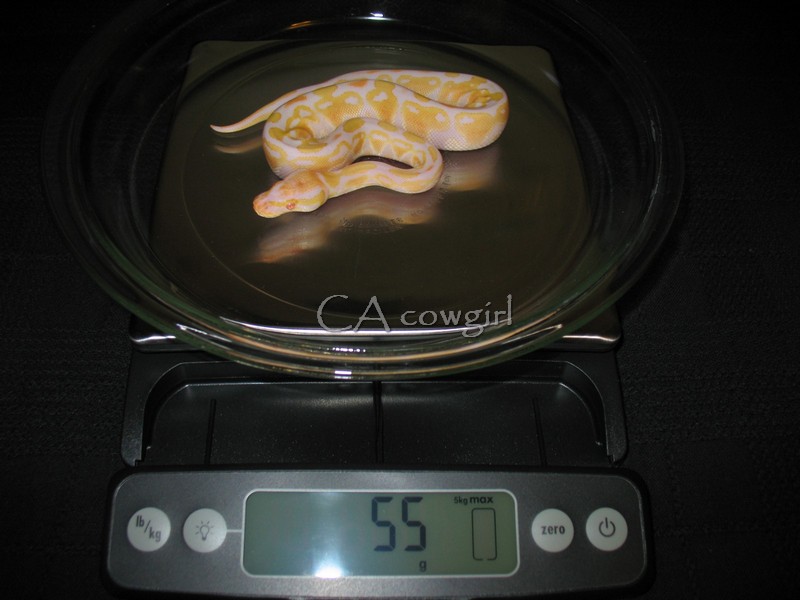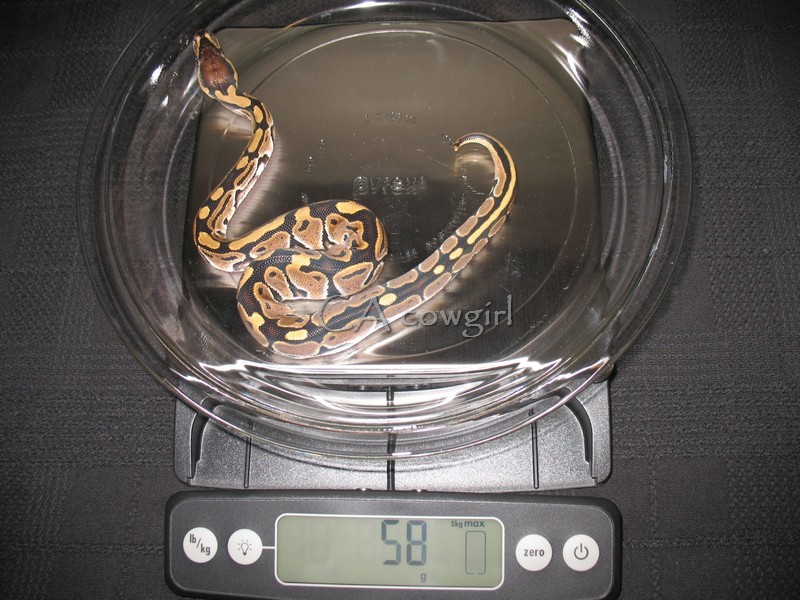» Site Navigation

1 members and 1,031 guests
Most users ever online was 47,180, 07-16-2025 at 05:30 PM.
» Today's Birthdays

» Stats

Members: 75,928
Threads: 249,128
Posts: 2,572,274
Top Poster: JLC (31,651)
|
-
BPnet Veteran

Why hatchlings don't eat on their own?
Q: What reasons have you found or suspect causes hatchlings to refuse to eat on their own?
I ask because in talking with others I find that it is fairly common for hatchlings not to eat on their own. Not that all baby ball pythons refuse their meals, but that perhaps out of a few clutchs you may have one animal that refuses to eat on their own. I mean, can't all baby pythons hop in the car and drive to pick up some pizza and grab a root beer from the fridge? (just kidding - I know they can't see over the dashboard just yet)
Seriously, what reasons do you find that might cause live meal refusals under ideal/perfect conditions?
*??
*??
Besides these conditions listed below, what conditions do you believe can cause a snake to refuse a meal?
*mites (or being treated for them)
*inconsistent temperatures or temps out of ideal range
*inconsistent humidity or humidity out of ideal range
*not offering at night
*not offering appropriately sized live prey
*not feeding in appropriately sized container
*lack of "perfect substrate" - aspen bedding
*not sufficient security for animal (i.e. too few hides small enough to allow animal to touch all sides with their coils)
*others??
Feel free to also share how you have adjusted the living conditions to get the animal(s) to eat on their own, or many times you've needed to assist feed and/or force feed your hatchling(s) until they ate on their own, or any other notes you care to share about your experiences.
As you may have guessed, I have been working with two stubborn feeders I purchased from a breeder. They acquired mites at some point, and have been treated with PAM and Reptile Spray. They also needed to be placed into tubs on aspen to better regulate the heat and humidity and offer a little more security. I feel they are on their way now, but this question begs to be answered, separate from the circumstances of my little boogers.
I look forward to reading your responses. 
-
The Following User Says Thank You to CA cowgirl For This Useful Post:
-
BPnet Veteran

Re: Why hatchlings don't eat on their own?
Here's the thread that got me thinking about this more... assist feeding
And here's pictures taken tonight of my hatchlings I've been worried about for just about a month, which seems like 10x as long!


-
-
Re: Why hatchlings don't eat on their own?
What size tubs are they in and how many hides do they have? Are they in a rack system?
At this point, it is probably security that is the issue.
Did they eat for the breeder a few times before being given to you? Generally a breeder will not sell a hatchling that hasn't eaten at least 3 or 4 times.
Where are you trying to feed the snakes? what time of day?
There are many many more reasons why a snake won't eat besides those reasons. Force feeding is the very last option. Assist feeding is okay, but there are many things you can try first.
-
-
Re: Why hatchlings don't eat on their own?
Big Gunns will tell you why he believes most have a problem.
Everyone needs to do this. Start your baby in a small shoebox on Aspen.... and feed it a live fuzzy. It's more likely to eat a mouse fuzzy, but BG usually will try rat fuzzie first. If it's worth a lot of money.... BG will give it a mouse fuzzie ..... just to be 100% sure it can digest it. Also, do not try and feed it too early. Let it absorb the yolk, but obviously don't let it get weak. If you try too early, with a scary hopper jumping all over it, this can cause your animal to become scared of food.
For some reason, Aspen works the best for newborn babies. BG has tried everything, and NOTHING on this planet works as well.
-
The Following User Says Thank You to Big Gunns For This Useful Post:
-
Registered User

Re: Why hatchlings don't eat on their own?
Quite honestly I had a talk with myself the other night at work, it was a very interesting discussion I might add.
In captivity we make sure that every snake survives the hatching process, and we get it to feed on it's own, right? Of course we do, we love them and want to see them grow up or sell them and get some cash so we can take the Mrs to the diner and get some bonus points.
Now think about this, in the wild they have no one doing this. No one is cutting the eggs to make sure the little ones don't drown in the egg. Their mother most often sure doesn't give a crap once they're out of the egg. What do you think the survival rate is in the wild? I would venture a guess and say 50-75% (just a guess, I have no source for this other than my discussion with myself).
The 25-50% that does not survive would be the problem feeders, born without an egg tooth, you name it. Just because we breed them in captivity does not mean we eliminate defects they can be born with.
Wow this turned out to be quite the novel, anyways, just me myself and I's take on the situation.
-
-
Re: Why hatchlings don't eat on their own?
 Originally Posted by Doxster

Quite honestly I had a talk with myself the other night at work, it was a very interesting discussion I might add.
In captivity we make sure that every snake survives the hatching process, and we get it to feed on it's own, right? Of course we do, we love them and want to see them grow up or sell them and get some cash so we can take the Mrs to the diner and get some bonus points.
Now think about this, in the wild they have no one doing this. No one is cutting the eggs to make sure the little ones don't drown in the egg. Their mother most often sure doesn't give a crap once they're out of the egg. What do you think the survival rate is in the wild? I would venture a guess and say 50-75% (just a guess, I have no source for this other than my discussion with myself).
The 25-50% that does not survive would be the problem feeders, born without an egg tooth, you name it. Just because we breed them in captivity does not mean we eliminate defects they can be born with.
Wow this turned out to be quite the novel, anyways, just me myself and I's take on the situation.
Big Gunns does believe this to be true Dox. BG is sure we save the life of animals that would have never made it in the wild. Kinda like what human mothers do. BG sees a lot of people walking around that would have never lived back in caveman days.  BG would rule in those days. BG would rule in those days.  
Big Gunns has never noticed this, but he has been told by other breeders that a mouse feeding adult is more likely to produce a baby that likes the same.
-
-
Registered User

Re: Why hatchlings don't eat on their own?
In my discussion with myself I came up with the good idea of reinstating the Spartan sorting process when babies are born. I mean come on, screw the stone age, I see people every day that shouldn't be able to survive today! Yet they do... Somehow... I say that's because their new mother (the government) takes care of them through their hatching process.
We need to bring back Sparta! Our genes are getting worthless!
My other self did not agree with me though, and the discussion about my genious idea came to a halt.
-
 Posting Permissions
Posting Permissions
- You may not post new threads
- You may not post replies
- You may not post attachments
- You may not edit your posts
-
Forum Rules
|









 Reply With Quote
Reply With Quote




